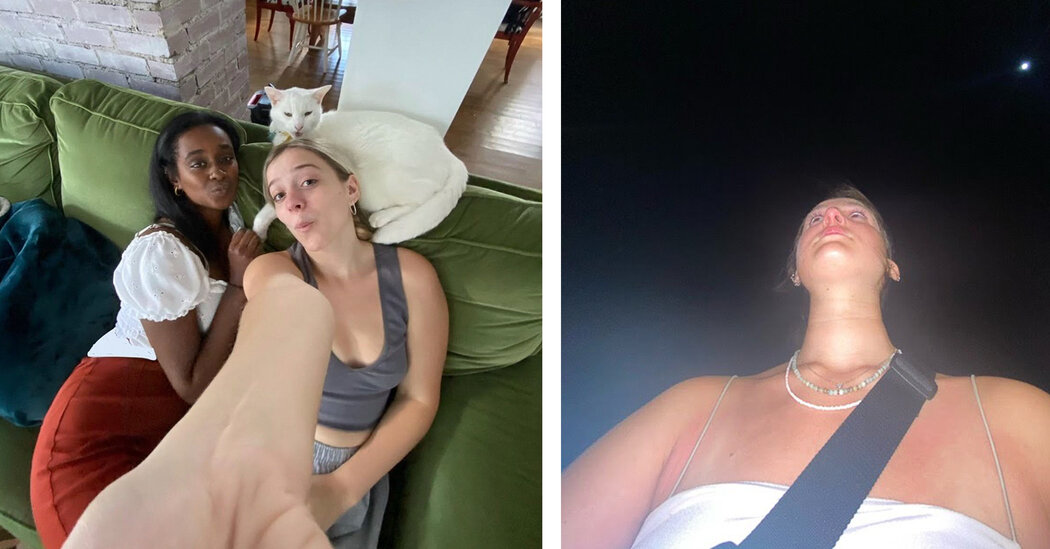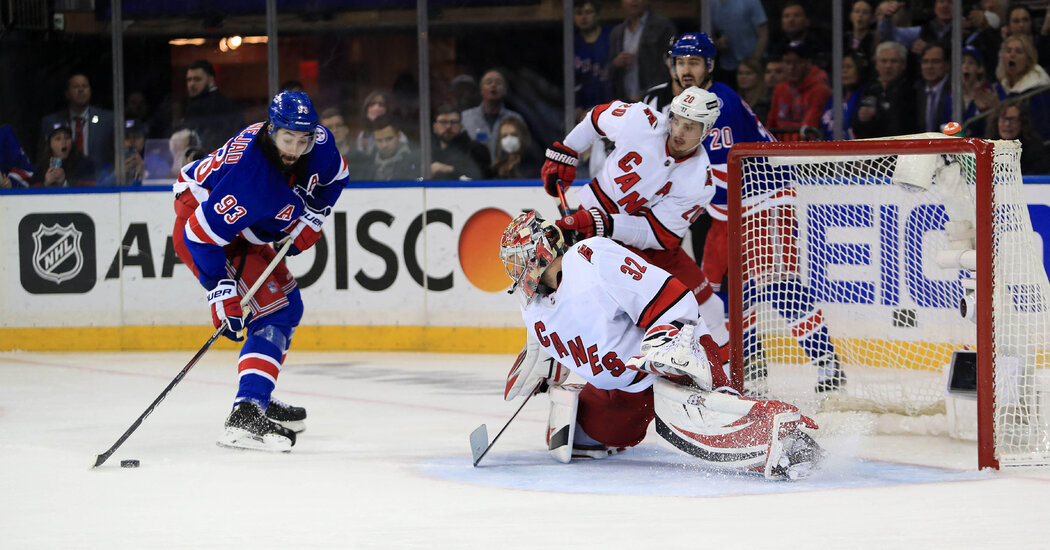
Julia Herzig, a 22-year-old from Larchmont, N.Y., has “an obsession.” It’s with taking a new kind of selfie — one that doesn’t exactly conform.
In some of these selfies, Ms. Herzig’s forehead bulges across half of the frame. Her eyes are half disks, peering up at something beyond the camera. Her nose juts out. Her mouth is invisible. These images are best when they have “ominous, creepy vibes,” she said.
Ms. Herzig started taking these pictures — called 0.5 selfies (pronounced “point five” selfies, and not “half” selfies) — when she upgraded to an iPhone 12 Pro last year and discovered that its back camera had an ultra-wide-angle lens that could make her and her friends look “distorted and crazy.”
But what seemed like a joke was bigger than Ms. Herzig, a recent graduate of Washington University in St. Louis, thought. A few months ago, after spring break, she opened Instagram to a feed full of 0.5 selfies.
“All of a sudden, one day, everyone was taking 0.5 selfies,” she said.
Wherever Gen Z gathers these days, a 0.5 selfie is almost bound to be taken, capturing the moment with random flattery — or comical lack thereof. The 0.5 selfies are showing up on Instagram, proliferating in group chats, becoming the talk of parties and often being snapped to chronicle the minutiae of daily life.
Unlike a traditional selfie, which people can endlessly prepare and pose for, the 0.5 selfie — so named because users tap 0.5x on a smartphone camera to toggle to ultra-wide mode — has become popular because it is far from curated. Since the ultra-wide-angle lens is built into the back cameras of phones, people can’t watch themselves take a 0.5 selfie, creating random images that convey the whimsy of distortion.
“You really don’t know how it’s going to turn out, so you just have to trust the process and hope something good comes out of it,” said Callie Booth, 19, from Rustburg, Va., who added that a good 0.5 selfie was the “antithesis” of a good front-facing one.
In their best 0.5 selfies, Ms. Booth said, she and her friends are blurry and straight-faced. “It’s not the traditional perfect picture,” she said. “It makes it funnier to look back on.”
The problem is that taking a 0.5 selfie is hard. Because of the back camera, angling and physical maneuvering are a must. If selfie-takers want to fit everybody into a frame, they have to stretch their arms as far out and up as possible. If they want to maximize how much a face distorts, they have to perch their phone perpendicular to their forehead and right at their hairline.
On top of those acrobatics, because the phone is flipped around, 0.5 selfie aficionados have to press its volume button to snap the picture, taking care not to mistake it for the power button. Sometimes 0.5 selfies with large groups require using a self timer as well. Nothing is visible until the selfie is taken, which is half the fun.
“I just take it and I don’t actually look at it until later, so it becomes more about capturing the moment versus seeing what everything looks like,” said Soul Park, 21, of Starkville, Miss.
Wide- and ultra-wide-angle lenses aren’t new. First patented in 1862, the lenses are often used to capture more of a scene with their wider field of vision, particularly in architectural, landscape and street photography.
“It goes back as far as photography has been a thing,” said Grant Willing, a photographer who reviews cameras for the electronics superstore B&H Photo Video.
Selfies, popularized by celebrities like Ellen DeGeneres, Kim Kardashian and Paris Hilton, are a more modern innovation (though even this is sometimes in dispute). In 2013, Oxford Dictionaries added “selfie” to its online dictionary and designated it the Word of the Year.
The 0.5 selfie was birthed by the wide-angle lens’s convergence with the selfie, made possible when ultra-wide-angle lenses were added to Apple’s iPhone 11 and Samsung’s Galaxy S10 in 2019 and to newer models.
Because of the wide angle, subjects closer to a lens seem larger, while those farther away seem smaller. That shift warps subjects in a way that is welcome in, for example, architectural photography but traditionally discouraged in portraiture.
“Wide angle for portrait shoots was always really different because it just made it more distorted,” said Alessandro Uribe-Rheinbolt, 23, a Colombian photographer based in Detroit.
Mr. Uribe-Rheinbolt said he had recently brought the wide angle from his portrait work — where clients have asked for the look of a 0.5 selfie — to his personal life, using it to capture his friends, his outfits and his daily routine.
“It does give it a more casual look,” he said. “There’s a lot more creativity with the way you angle and the way that you put it closer.”
An unedited 0.5 selfie is more organically playful than a front-facing selfie. Posting the selfies on Instagram, where limbs are noodly or eyes are buggy, is meant to be silly, making it seem like the photographers take themselves — and social media — less seriously.
“Something about it breaks the fourth wall because you’re acknowledging that you’re taking a picture for the sake of taking a picture,” said Hannah Kaplon, 21, from Sacramento. “It’s trying to make Instagram casual again.”
Ms. Kaplon, a recent graduate of Duke University, said she now took a 0.5 selfie for most occasions: a late night studying in the library, a dinner with 11 guests, a basketball game watch party.
“Pretty soon, wherever my friends and I were, I was like, ‘We have to take a 0.5 selfie,’” she said. “The trend has taken on a life of its own.”




